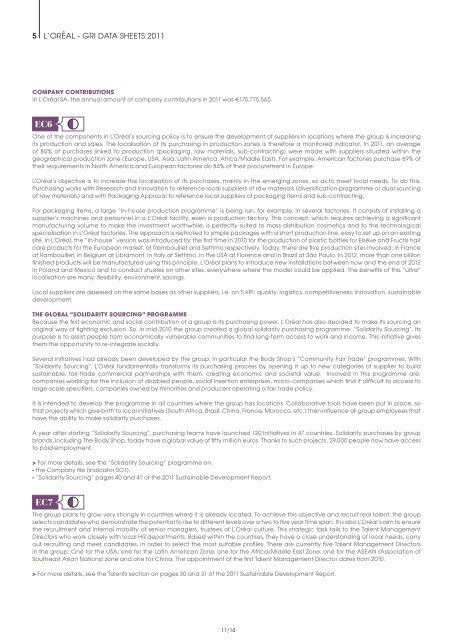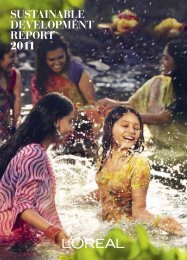Organizational Strategy - Sustainable Development - L'Oréal
Organizational Strategy - Sustainable Development - L'Oréal
Organizational Strategy - Sustainable Development - L'Oréal
Create successful ePaper yourself
Turn your PDF publications into a flip-book with our unique Google optimized e-Paper software.
5 L’oréaL - GrI DaTa SHEETS 2011<br />
COMPaNY CONTRIbUTIONs<br />
In L’oréal Sa, the annual amount of company contributions in 2011 was €175,775,565.<br />
EC6<br />
one of the components in L’oréal’s sourcing policy is to ensure the development of suppliers in locations where the group is increasing<br />
its production and sales. The localisation of its purchasing in production zones is therefore a monitored indicator. In 2011, an average<br />
of 80% of purchases linked to production (packaging, raw materials, sub-contracting) were made with suppliers situated within the<br />
geographical production zone (Europe, USa, asia, Latin america, africa/Middle East). For example, american factories purchase 69% of<br />
their requirements in North america and European factories do 84% of their procurement in Europe.<br />
L’oréal’s objective is to increase the localisation of its purchases, mainly in the emerging zones, so as to meet local needs. To do this,<br />
Purchasing works with research and Innovation to reference local suppliers of raw materials (diversification programme or dual sourcing<br />
of raw materials) and with Packaging approval to reference local suppliers of packaging items and sub-contracting.<br />
For packaging items, a large “In-house production programme” is being run, for example, in several factories. It consists of installing a<br />
supplier’s machines and personnel in a L’oréal facility, even a production factory. This concept, which requires achieving a significant<br />
manufacturing volume to make the investment worthwhile, is perfectly suited to mass distribution cosmetics and to the technological<br />
specialisation in L’oréal factories. The approach is restricted to simple packages with a short production line, easy to set up on an existing<br />
site. In L’oréal, the “In-house” version was introduced for the first time in 2010 for the production of plastic bottles for Elsève and Fructis hair<br />
care products for the European market, at rambouillet and Settimo respectively. Today, there are five production sites involved: in France<br />
at rambouillet, in Belgium at Libramont, in Italy at Settimo, in the USa at Florence and in Brazil at São Paulo. In 2012, more than one billion<br />
finished products will be manufactured using this principle. L’oréal plans to introduce new installations between now and the end of 2012<br />
in Poland and Mexico and to conduct studies on other sites, everywhere where the model could be applied. The benefits of this “ultra”<br />
localisation are many: flexibility, environment, savings.<br />
Local suppliers are assessed on the same bases as other suppliers, i.e. on 5 KPI: quality, logistics, competitiveness, innovation, sustainable<br />
development.<br />
THe GLObaL “sOLIDaRITY sOURCING” PROGRaMMe<br />
Because the first economic and social contribution of a group is its purchasing power, L’oréal has also decided to make its sourcing an<br />
original way of fighting exclusion. So, in mid-2010 the group created a global solidarity purchasing programme: “Solidarity Sourcing”. Its<br />
purpose is to assist people from economically vulnerable communities to find long-term access to work and income. This initiative gives<br />
them the opportunity to re-integrate socially.<br />
Several initiatives had already been developed by the group, in particular the Body Shop’s “Community Fair Trade” programmes. With<br />
“Solidarity Sourcing”, L’oréal fundamentally transforms its purchasing process by opening it up to new categories of supplier to build<br />
sustainable, fair-trade commercial partnerships with them, creating economic and societal value. Involved in this programme are:<br />
companies working for the inclusion of disabled people, social insertion enterprises, micro-companies which find it difficult to access to<br />
large-scale specifiers, companies owned by minorities and producers operating a fair trade policy.<br />
It is intended to develop the programme in all countries where the group has locations. Collaborative tools have been put in place, so<br />
that projects which give birth to local initiatives (South africa, Brazil, China, France, Morocco, etc.) then influence all group employees that<br />
have the ability to make solidarity purchases.<br />
a year after starting “Solidarity Sourcing”, purchasing teams have launched 120 initiatives in 47 countries. Solidarity purchases by group<br />
brands, including The Body Shop, today have a global value of fifty million euros. Thanks to such projects, 29,000 people now have access<br />
to paid employment.<br />
> For more details, see the “Solidarity Sourcing” programme on:<br />
- the Company file (indicator So1).<br />
- “Solidarity Sourcing” pages 40 and 41 of the 2011 <strong>Sustainable</strong> <strong>Development</strong> report.<br />
EC7<br />
The group plans to grow very strongly in countries where it is already located. To achieve this objective and recruit real talent, the group<br />
selects candidates who demonstrate the potential to rise to different levels over a two to five year time span. It is also L’oréal’s aim to ensure<br />
the recruitment and internal mobility of senior managers, trustees of L’oréal culture. This strategic task falls to the Talent Management<br />
Directors who work closely with local Hr departments. Based within the countries, they have a close understanding of local needs, carry<br />
out recruiting and meet candidates, in order to select the most suitable profiles. There are currently five Talent Management Directors<br />
in the group: one for the USa, one for the Latin american Zone, one for the africa/Middle East Zone, one for the aSEaN (association of<br />
Southeast asian Nations) zone and one for China. The appointment of the first Talent Management Director dates from 2010.<br />
> For more details, see the Talents section on pages 30 and 31 of the 2011 <strong>Sustainable</strong> <strong>Development</strong> report.<br />
11/14






